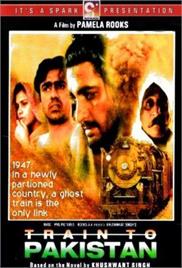Be Careful of Fake Websites. Always use HindiMovies.to domain & Join our Telegram Channel for Latest Updates.

Likes: 3
Views: 5.04K
Tensions run high near the border of British India, which is about to be partitioned with a new country called Pakistan. Sikhs living in this border town have heard numerous stories of Muslims killing, raping, and looting other Sikhs, Hindus, and Christians, and many of whom are their friends and relatives. Enraged at the loss of law and order, they plan their own attack on a trainful of Muslims leaving British India. The train is overcrowded with tens and thousands of migrating passengers, who are even perched on the windows and seated on the roof of this train. The plot is to tear the bridge down when the train is on it, and no one will dare stop these men to carry out this horrific task.
Duration: 111 min
Released: 1998
IMDb Rating: 6.9/10 (153 Votes)
Genre: Drama, Hindi Movies, War
Stars: Mohan Agashe, Nirmal Pandey, Rajit Kapoor, Smriti Mishra
Directors: Pamela Rooks
Writers: Pamela Rooks, Khushwant Singh
Year: 1998
Server 1 – Openload
Server 2 – Vidto
Server 3 – Streamin
Server 4 – Nowvideo
Server 5 – Bitvid
Server 6 – Wholecloud
Server 7 – Cloudtime
Server 8 – Youtube
Server 9 – Youtube
Train to Pakistan (1998): A Powerful Cinematic Depiction of Partition
Introduction
Train to Pakistan is a compelling 1998 Hindi-language drama film that intricately portrays the turmoil and human tragedy surrounding the Partition of India in 1947. Directed by Pamela Rooks and based on the acclaimed novel of the same name by Khushwant Singh, the film masterfully captures the communal tensions, personal conflicts, and heartbreak that arose during one of the most significant and traumatic events in South Asian history.
Plot Summary
The movie is centered around the quiet, peaceful village of Mano Majra, located close to the India-Pakistan border. Before Partition, the village is a mixed community where Sikhs, Muslims, and Hindus live in relative harmony. However, as news of Partition spreads and communal tensions rise, the village's fragile peace begins to crack. The story focuses on the arrival of a train that carries the dead bodies of victims of communal violence from Pakistan to India, symbolizing the extreme violence and heartbreak unleashed by the Partition.
At the heart of the narrative is the tragic love story between Juggut Singh (Nirmal Pandey), a local Sikh outlaw, and Nooran (Kiron Kher), a Muslim girl from the village. This romance poignantly highlights the human cost of communal hatred and the desperation of individuals caught in a larger political maelstrom.
The movie expertly portrays how ordinary villagers grapple with extraordinary circumstances—neighbors turning against each other, friendships shattered, and the harrowing choices that people must make to survive. The arrival of soldiers, curfews, and escalating violence transform the idyllic Mano Majra into a site of fear and suspicion. The climax revolves around a potential massacre and the moral dilemmas faced by the protagonists, culminating in acts of bravery and sacrifice.
Main Actors
Director and Writer
Train to Pakistan was directed by Pamela Rooks, a notable filmmaker known for her sensitivity and literary inclinations in cinema. Rooks' direction is marked by her ability to translate complex narrative themes onto screen with subtlety and emotional resonance. The screenplay adapts Khushwant Singh's critically acclaimed novel, which is celebrated worldwide for its stark yet empathetic documentary-style narrative on Partition. Singh's writing explores the human dimension of political events, and the film remains faithful to the spirit of his storytelling.
Cinematic and Historical Impact
The film stands out for its realistic portrayal of events surrounding Partition, avoiding sensationalism and instead focusing on personal stories and ethical dilemmas. The cinematography captures the rustic ambiance of rural India in the 1940s, with earthy tones and period-appropriate settings that immerse viewers fully into the era.
By focusing on intercultural friendships and love, the movie underscores the possibility of harmony even in the worst of times and charts how external political forces dismantle such communal bonds. Its critical take on the physical and emotional displacement resonates deeply in the collective memory of the Indian subcontinent.
Music and Soundtrack
Unlike typical Bollywood films known for their musical extravaganzas, Train to Pakistan maintains a restrained approach to its soundtrack to support the somber and serious tone of the narrative. The music is composed to accentuate the emotional and atmospheric depth rather than distract or entertain. While it doesn't feature the typical song-and-dance sequences of Bollywood, the background score subtly elevates the poignant moments and the tense atmosphere prevalent throughout the film.
Conclusion
Train to Pakistan (1998) is a sensitive and poignant film that faithfully brings to life the harrowing experiences of Partition. The masterful direction of Pamela Rooks, combined with strong performances from Nirmal Pandey, Kiron Kher, and Mohan Agashe, crafts a deeply moving story that remains ever relevant. It serves as a humane reminder of the cost of divisive politics and the enduring resilience of humanity in the face of adversity. A must-watch for those interested in historical dramas and South Asian cinema, this film offers profound insights into one of the darkest chapters of Indian history through the intimate lens of village life.